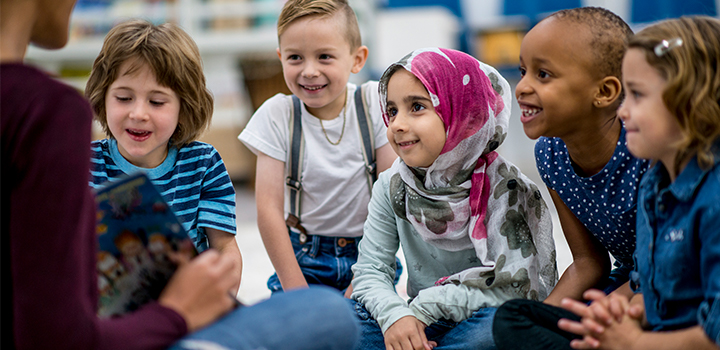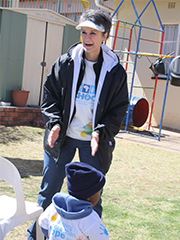Bringing school to children with cancer

Life has showered Childhood Cancer Educator, Adri Ludick, with children. She’s raised them, taught them, managed a hospital school, written training documents and adapted school curricula. Her passion lies in helping children with cancer through schooling.
Ludick is the Programme Development Manager at the CHOC Childhood Cancer Foundation SA, based in Gauteng. “Kids with cancer are real warriors,” she says. “They grow up so quickly through their cancer experience and I always found them to be more mature than their peers.
When you work in the wards, you get to know the children so well. When I was a hospital school teacher I always experienced that children never declined having schooling, even when they were very sick, because attending any form of school represents normality to them. It’s something they aspire to - it keeps them motivated and in touch with their normal lives.”
Listen to Adri Ludick share critical views on stabilising a child’s education during and after their cancer treatment here.
Ludick develops and monitors programmes and gives support and information to caregivers working with childhood cancer and life-threatening blood disorders. CHOC provides psycho-social, practical, parental and family support and accommodation at CHOC Houses and Lodges for out-of-town patients.

Adri Ludick - Programme Development Manager at the CHOC Childhood Cancer Foundation
Ludick’s career evolution
Ludick’s vocation came to her when she was eight-year’s old and as result of knowing a Down Syndrome baby who was born to close family friends and whom she loved dearly. “She was my motivation to study special needs education,” she says.
After qualifying in specialised education at the University of Port Elizabeth, Ludick started her career by teaching a small group of special needs children at a Johannesburg-based primary school where their challenges ranged from physical to mental disabilities and impairments. She later used this experience as principal of the Tygerberg Hospital School (1997-2006).
“We started with two of us in an office-sized room. When I left in 2006, the school had 7 educators, a complete disability-friendly computer lab, an art room, a library, and class rooms, the iThuba Post Psychiatric Adolescent unit and a satellite school at Brooklyn Chest Hospital,” she says.
Ludick’s responsibility at the school was to teach the patients in the paediatric oncology and psychiatry wards. Ludick saw some strong common threads running through parent, teacher and patient-education concerns. They wanted to know how to deal with returning cancer survivors, how to reintegrate them into the classroom, how to ensure they kept up to speed academically while in hospital, what the do’s and don’ts were when the child was hospitalised and when the child returned to mainstream school. Another worry they raised was how to deal with siblings who sometimes felt rejected and left out.
“When a kid has cancer, it influences the entire community. So, I sat down to write a teacher-friendly guide on how to handle children with cancer in the classroom. Simply called "Back to School”, the book (which can be downloaded here) is a synthesis of contributions from top paediatric oncologists, social workers and CHOC regional managers – all aiming to support educators and caregivers of kids with cancer.
Not content with that, in 2011 Ludick designed a training and education programme for healthcare workers and traditional healers aimed at recognising the early warning signs of childhood cancer. Ludick and her team have since trained over 24 000 people using this programme.
“If this project can continue to make a difference and save children’s lives then I feel I’ve achieved something in my life,” says Ludick. She cites the International Association for Cancer’s 2017 research findings that over the last two decades, the prevalence of childhood cancer has increased by 13% globally - a strong indicator of improved diagnosis for this illness.
CHOC advocates for children with cancer, not only in SA but also in Africa and collaborates with the SA National Department of Health to ensure that all children diagnosed with cancer have access to specialised treatment and care.
The Discovery Health Medical Scheme is an independent non-profit entity governed by the Medical Schemes Act, and regulated by the Council for Medical Schemes. It is administered by a separate company, Discovery Health (Pty) Ltd, an authorised financial services provider.
Related articles
Catching childhood cancer early ensures better outcomes: Prof Janet Poole
Unlike most adult cancers, cancer in children can be fast-growing and should be treated as an emergency says Professor Janet Poole.
From two children with cancer, to the COWS
For Kerrin and Grant Bain, losing Jessica (their 20-month-old daughter) to cancer was gut-wrenching. Two years later they heard that their daughter Georgia, had brain cancer. The journey led them to starting The Cows, fundraising for CHOC.
11-year old Hendrik Stopforth beats Leukaemia
Hendrik Stopforth's Acute Myelodysplastic Leukaemia (AML), was a two-year trial by fire during which his family bonded strongly, received huge support from extended family and was financially buoyed by the generosity of strangers.